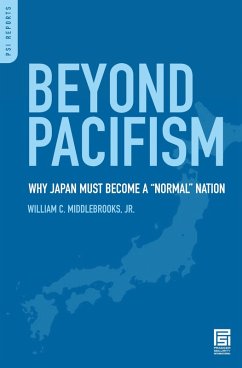The so-called pacifist clause of the Japanese Constitution (Article 9) binds the Japanese people forever to renounce war as a sovereign right of the nation and the threat or use of force as a means of settling international disputes. Beyond Pacifism argues that Japan must either repeal Article 9, or face a future in which Japan might be compelled to surrender sovereign authority in order to appease one or more of its immediate neighbors. If Japan cannot free itself of the constraints of its constitutional pacifism and choose to become a normal nation, willing and able to defend itself and its interests, it must endure what former Prime Minister Koizumi describes as the peace of slaves. Since 1952 Japan has followed the path of reinterpreting Article 9 in order to work around its pacifist strictures. Many Japanese party leaders-including prime ministers Abe and Koizumi-have called for Article 9 to be revised by the addition of a clause authorizing the use of force for the purpose of self-defense against aggression directed against the Japanese nation. Most foreign commentators and scholars urge Tokyo to continue to work around Article 9 without amendment. By contrast, the author argues that neither reinterpretation nor revision will allow Japan to counter the growing military threats from North Korea and China. Japan's health as a democratic state, contends Middlebrooks, requires an honest re-alignment of its law with its modern national identity, which is normal and no longer poses a militaristic threat to regional stability.
Bitte wählen Sie Ihr Anliegen aus.
Rechnungen
Retourenschein anfordern
Bestellstatus
Storno









